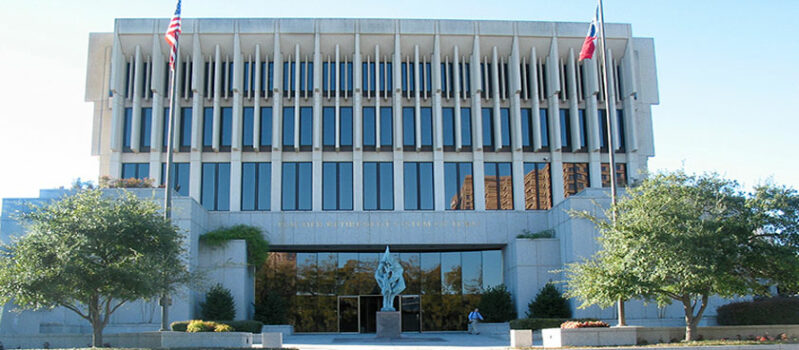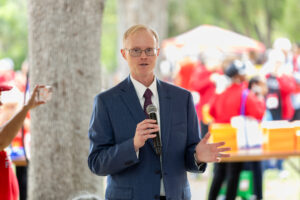TRS Board of Trustees Meets, Discusses Actuarial Valuation, Funding Policies, and Space Needs
Executive Summary
- TRTA public comments improve funding policy adopted by TRS Board
- TRS Trustees vote to adopt funding policy designed to manage contribution requests to the Legislature in a manner that systematically will decrease the unfunded liability (which sits at $55.6 billion) over time and be 100% funded
- TRS pension fund valuation shows 29-year funding period, 76.4% funded ratio
- The 2019 estimated market return for the plan year that ended on August 31 was 5.0%, market value at an all-time high of $161 billion
- SB 12 put pension fund on a healthy path, but changes won’t be seen for many years; essential that 2021 Legislature funds next installment
- TRS adopts resolution to begin negotiations and planning for long-term space needs for TRS headquarters
The Teacher Retirement System of Texas (TRS) Board of Trustees met Thursday, December 12 and Friday, December 13. Highlights from this meeting included discussions about adopting funding and benefit enhancement policies as required by SB 2224, the annual actuarial valuation of the pension fund and long-term space planning for the TRS headquarters. TRTA addressed the board and worked with them to make sure their decisions meet the needs of retirees.
TRTA Addresses TRS Board
Texas Retired Teachers Association (TRTA) Executive Director Tim Lee addressed the TRS Board about three important issues:
- Pursuant to SB 2224, all Texas pension systems must adopt a funding policy to demonstrate how and when the fund will be 100% funded based on current contributions and benefit levels. The policy proposed by the TRS actuary included language which may have sent a message to the Legislature that TRS would be opposed to any type of cost-of-living increase that was not fully funded with a specific cash appropriation from the Legislature. TRTA and other stakeholders asked that this language be deleted from the policy on benefit enhancements. The TRS Board listened to the voice of the membership and agreed to delete the language. TRTA thanked the Board for their willingness to work with us.
- As a result of TRTA lobby efforts last session, SB 12 changed prior practice to require all school district employers including those who pay into Social Security to pay equal contributions (2% starting in 2025) into the TRS fund. However, even though their employees get equal pension benefits, higher education employers do not pay the same in contributions to the fund as ISD employers. TRTA asked the board to consider this issue as they prepare a new funding policy because this inequality has a significant cost to the pension fund.
- TRS is considering a new facilities plan for the TRS headquarters. TRTA asked the Board to ensure that they include input from the membership as they go forward with this plan. TRTA offered all board members the option of speaking directly to our members through our social media outlets (such as Facebook live) and our print publication.
As a result of direct input from TRTA and other stakeholders, the resolution specifically states that the final plan must ensure the best interests of the members of TRS and any final plan must come back to the Board for final approval at a future meeting.
Long-term Space Needs for TRS Headquarters
The TRS Board adopted a resolution allowing TRS Executive Director Brian Guthrie to begin negotiating the development of a new campus for TRS in the Austin area. Ownership of the current TRS headquarters building and real estate is envisioned to remain with the fund and become an investment vehicle for the fund to sell or redevelop as an investment asset.
Guthrie presented a preliminary plan that includes building a new campus, possibly moving some staff into various regional locations across Texas to better serve the members, and a potential timeline. The plan includes continuing to lease property in downtown Austin for the investment division but moving the division to the new campus during phase two of the project. He made clear that projections for this plan will have a positive financial impact for the fund over time due to the high value of the current downtown Austin property.
Actuarial Valuation Results
An actuarial valuation of the pension fund was conducted by TRS in August 2019. The valuation took into consideration the recent changes made to the fund due to the passage of Senate Bill 12 during the 86th Legislative Session earlier this year.
As members of the Texas Retired Teachers Association (TRTA) know, a one-time supplemental payment was provided to retirees this fall, capped at $2000. SB 12 also increased contribution rates to the fund from the state, school districts, and members.
The active member contribution rate is scheduled to increase from 7.70% to 8.25% of payroll, and the state/employer base contribution rate will increase from 6.80% to 8.25% of payroll by Fiscal Year 2024. Employers covering employees not participating in Social Security contribute an additional amount that will increase from 1.50% to 2.00% by FY 2025. Public education employers that are covered by SS will also pay this amount going forward.
TRS projected that these contribution rate changes would produce a 29-year funding period based on smoothed assets by August 31. Additionally, House Bill 3 provided salary increases to certain active employee groups. Because contributions to the fund are tied to active teacher payroll, these salary increases also impacted the pension fund. This funding period is based on the assumption that all new contribution levels will continue and that there will be no changes in retirees’ benefits.
The trustees reviewed the pension fund’s investment returns as well. The estimated market return for the plan year that ended on August 31 was 5.0%. The average rate of return over the last 5 years was approximately 6.5%, 9.0% over the last 10 years, and 6.2% over the last 20 years. Since August, the fund has performed very well and now sits at a record high of $161 billion.
Projections have an expectation of an increasing funded status, although increasing very slowly. Currently at a 76.4% funded ratio, the fund is projected to take 7 years to reach 80%. Projections have an expectation of the Unfunded Actuarial Accrued Liability (UAAL) increasing to $55.6 billion in 2028 before beginning to decline (see chart below).

Pension Fund is on the Right Track, TRS Proposes Policies for Maintaining Fund’s Progress
As expected, the passage of SB12 has dramatically improved the projected health of the system. Though the fund is on a healthy financial path, it is not expected to improve for some time. Because of this, the TRS Board of Trustees is adopting a funding policy that “will systematically decrease the UAAL over time in order to achieve a funded ratio of the system that is equal to or greater than 100 percent.”
The funding policy adopted by TRS includes a provision on when to request additional contributions when submitting their funding requests to the Legislature. This portion of the policy states that “after the phase-in of contributions in SB 12, if at any time the annual valuation of TRS does not project the UAAL to begin to decline in the next 5 years, the LAR request for TRS will include an increase in contribution rates so that the UAAL would be projected to begin to decline the year following the legislative session.”
The policy continues “the Board does not support legislative action that would reduce or fail to fund the statutory contribution rates.”
Per TRS Executive Director Brian Guthrie, “the funding policy being adopted by the Board provides a strong step towards changing the focus towards actually reducing the UAAL over time.”
New Funding Policy Adopted Regarding Benefit Enhancements for Retirees
The trustees are also adopted a policy on benefit enhancements for retirees. As our members may know, TRS retirees are not able to receive cost-of-living increases of any kind, including supplemental payments, unless authorized by the Texas Legislature.
During the meeting, the Board emphasized that they will evaluate any potential proposal for a benefit increase for retirees for consistency with their goal of a decreasing the unfunded liability.
As our members may also know, cost-of-living increases cause the pension fund’s unfunded liability to increase. Because the TRS Board has adopted a policy to reach a 100% funded ratio, the Board originally considered adopting a policy what would not use money from the pension fund to pay for any potential COLAs. Instead, those funds would have to come from a one-time appropriation from the Texas Legislature, meaning the liability of any future COLAs would have to be paid for in advance.
The policy originally read “the Board of Trustees supports providing a benefit enhancement to retirees under Tex. Gov’t Code § 821.006 provided that, at the time of adoption, the benefit enhancement is paid for with a one-time appropriation in an amount necessary to cover the actuarial liability associated with the benefit enhancement.”
TRTA Executive Director Tim Lee provided public comment during the TRS Board of Trustees meeting, covering the topic of TRS creating a policy for benefit enhancements for retirees.
Lee referenced the Texas Pension Review Board interim study about funding policies for state retirement systems (found by clicking here), which states that “when facing stakeholder pressure for benefit enhancements, a written funding policy can help trustees by shifting the conversation away from the merits of the potential benefit increase to whether or not such an increase can be implemented within the parameters of the system’s funding policy.”
Lee continued by quoting the study “for example, although a board may desire to grant a cost-of-living adjustment, a funding policy might state that such action may not be considered if the plan’s funded status would dip below a specific level after the COLA, thereby ensuring continued progress towards the plan’s stated funding goals.”
Lee stated “TRTA believes if this language is ultimately adopted, TRS will be in a position of putting themselves in a box of not supporting a benefit enhancement,” adding that “the Legislature has many options for providing benefit increases.”
Lee also stated the difficulty in getting a benefit increase approved if the Legislature must fully fund the liability of the increase, saying “a 1% increase for retirees would take a $1 billion appropriation from the Legislature.”
Over the past eight decades, when COLAs have been provided to retirees, Texas has amortized the liability over an extended period of time, which by state law must be done within a 31-year period. $1 billion paid out over 31 years is more tenable that an immediate budget outlay.
Lee asked the Board of Trustees to consider these factors when discussing and voting upon the benefit enhancement policy.
Monty Exter of the Association of Texas Professional Educators (ATPE) agreed with Lee, stating such a policy “could put you (the TRS Board) at odds with the Legislature” and that the policy is unnecessary because of the way current law works.
In response to comments made by TRTA, ATPE, and others, the TRS Board of Trustees continued discussing their recommended policy for benefit enhancements and asked Joe Newton, who works for actuarial firm Gabriel, Roeder, Smith and Company, if the portion of the policy regarding an appropriation from the state to cover all liabilities was necessary.
Mr. Newton commented that if funding is provided upfront, the answer to whether or a not a benefit enhancement will occur is always yes. However, he added that without this language, the funding policy still accomplishes what the Legislature has asked of the system and is not necessary.
TRS Executive Brian Guthrie stated that he understood the reservations expressed by Tim Lee and Monty Exter and ultimately recommended to the TRS trustees that the portion in question be removed from the policy. Guthrie added “the broad strokes painted by the first statement covers all the options” that the Legislature might consider when passing benefit enhancements.
TRTA supports this change, as it provides for more flexibility when the Legislature addresses possible future benefit enhancements.
TRTA is pleased that the changes that were requested for the funding policy were given consideration and that the TRS Board responded by bearing in mind the interests of their members and the recommendations of TRTA. We thank the TRS trustees and staff for their dedication to ensuring the longevity of benefits for all current and future Texas retired public education employees.
The Texas Retired Teachers Association exists to protect your TRS retirement and fights to make it better. Please consider becoming a member and joining the largest community of TRS retirees in the nation.




